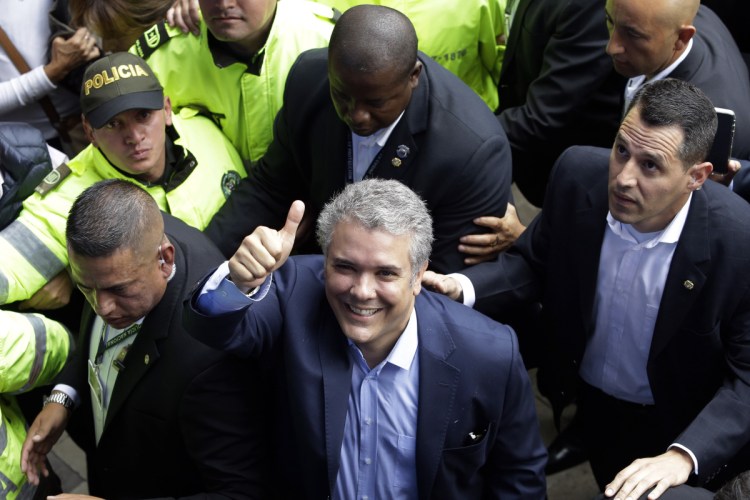BOGOTA, Colombia — Colombians hit the polls in the first round of their presidential election Sunday to choose who they want to guide Latin America’s third most populous nation.
The country is going through a troubled moment marked by soaring cocaine production, a shaky peace accord with a Marxist rebel group and an influx of Venezuelan migrants flooding over the border to escape an economic crisis next door.
The conservative 41-year-old lawyer Iván Duque was leading in pre-election polls, followed by the progressive 58-year-old economist and ex-mayor of Bogotá, Gustavo Petro.
Other candidates are a mathematician who was the centrist mayor of Medellín, Sergio Fajardo, and a former vice-president, Germán Vargas Lleras, on the center-right.
No candidate was expected to win outright Sunday, and there will likely be a run-off, probably involving Duque and Petro. That vote would come June 17, and it would give Colombians a choice between right and left, one they haven’t had for decades.
Colombia is polarized. A 2016 peace accord led to the demobilization of thousands of fighters from the FARC rebel group last year, but while some Colombians want to forgive and move on, others are frustrated, insisting on harsher punishment for FARC leaders than is currently pending.
And a wave of poor Venezuelan migrants crossing illegally into Colombia is challenging an under-employed work force.
In the post-conflict era, the longtime American ally’s security issues are changing. Colombia’s next president will have to deal with a major increase in the amount of land under coca cultivation.
After two decades and a U.S. package of over $10 billion in aid to fight against drug-trafficking groups, a smattering of violent criminal organizations has arisen with the end of the fighting. Peace talks with the ELN, a smaller rebel group, appear fragile.
“If Petro were to win, it could create big problems for Colombia’s relations with the United States, least because I would think (President) Trump’s immediate reaction to Petro would be very negative,” said Philip Paterson, a Latin American analyst at Oxford Analytica. “We might see a lot more frustration between Washington and Bogotá in terms of Washington pushing for coca crop eradication programs – which I think Petro would be far less likely to follow through on, where Duque would do it enthusiastically.”
The issues on voters’ minds reflect a Colombia that more and more resembles its South American neighbors, where ire toward corruption, frustration over access to effective healthcare, and attention to environmental issues are competing with Colombia’s age-old political debates of how to tackle drug trafficking and stop armed conflict.
For voters, Duque represents a nostalgic return to the hardline security stance of former president Alvaro Uribe. Duque has called for harsher punishments for FARC leaders, who currently face restricted liberties if jurors find they tell the truth in a special tribunal.
He was elected in 2014 as a senator in Uribe’s Centro Democratico party. Before that, he worked at the Inter-American Development Bank in Washington.
Duque argues that Colombia’s economy is hamstrung by regulations and taxes on private enterprise. He’s calling for tax cuts and reductions in public spending.
Detractors insist that behind Duque’s moderate rhetoric are staunch, ultra-conservative sectors backed by regional business elites.
Send questions/comments to the editors.



Success. Please wait for the page to reload. If the page does not reload within 5 seconds, please refresh the page.
Enter your email and password to access comments.
Hi, to comment on stories you must . This profile is in addition to your subscription and website login.
Already have a commenting profile? .
Invalid username/password.
Please check your email to confirm and complete your registration.
Only subscribers are eligible to post comments. Please subscribe or login first for digital access. Here’s why.
Use the form below to reset your password. When you've submitted your account email, we will send an email with a reset code.